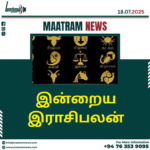புதிய கல்விச் சீர்திருத்தங்கள் – 2026
2026 ஆம் ஆண்டிற்கான புதிய கல்விச் சீர்திருத்தங்கள் தொடர்பான தெளிவான அறிவுறுத்தல்கள் கொண்ட கல்விச் சுற்றறிக்கை விரைவில் வெளிவரவுள்ளது. எனினும் நண்பர்களின் அறிதலுக்காக சில முக்கிய அம்சங்களை இங்கு தருகிறேன்.
இச்சீர்திருத்தமானது 5 தூண்களின் (Pillars) கீழ் முன்னெடுக்கப்படுகிறது
- பாடங்களின் கலைத்திட்ட மறுசீரமைப்பும் அபிவிருத்தியும்
- வளவாளர் பயிற்சியும் ஆசிரிய பயிற்சியும்
- நிருவாக மறுசீரமைப்பும் உட்கட்டமைப்பு அபிவிருத்தியும்
- கணிப்பீடும் மதிப்பீடும்
- சமூக விழிப்பூட்டலும் பிரசாரமும்
என்பன அந்த 5 தூண்களும் ஆகும்.
ஆரம்ப கல்வியின் பாடங்கள்
I. தமிழ் (வாசிப்பு நூலும் செயல் நூலும்)
II. ஆங்கிலம்
Iii. இரண்டாம் தேசிய மொழி
Iv. கணிதம்
V. சமயமும் விழுமிய கல்வியும்
Vi. அடிப்படை விஞ்ஞானமும் சுற்றாடல் சார்ந்த செயல்பாடும்.
Vii. ஒன்றிணைந்த அழகியல்
Viii. சுகாதாரமும் உடற்கல்வியும்.
IX. இணைப்பாட விதான செயற்பாடுகள்
ஆரம்ப பிரிவுகள் தற்போது உள்ளது போலவே முதன்மை நிலைகள் கொண்டிருக்கும்.
இடைநிலைக் கல்வி
மொடியூல் முறையும் GPA முறையும் தரம் 6 தொடக்கம் தடைமுறைக்கு வருகிறது.
35 CREDITS
தரம் 6-9 வரை 14 பாடங்கள் காணப்படும்
அத்தியாவசிய (Essential subjects) பாடங்கள் 14க்கும் விளையாட்டு மற்றும் மாணவர் சங்கங்கள் மற்றும் கழகங்களின் பங்குபற்றலுக்குமாக 30 கிறெடிட்கள் (30 credits) வழங்கப்படும்.
தொடருறு கல்விக்கு வழிப்படுத்தும் மொடியூல் செயற்பாட்டுக்காக ஒவ்வொரு தவணைக்கும் 3 கிறெடிட்கள் (03 credits) கிடைக்கும்.
வாழ்க்கைத் தேர்ச்சியுடன் கூடிய பன்முனைத்திறன்களுக்காக (Transversal skills) 2 கிறெடிட்கள் (2 credits) கிடைக்கும்.
க. பொ.த (சா/த) பரீட்சைக்கு வரலாறு கட்டாய பாடமில்லை. ஆனால் தெரிவுப் பாடமாக (Elective subject) வருகிறது.
30 கிறெடிட்களுக்குரிய பாடங்கள்
1.தமிழ் மொழி
2.ஆங்கில மொழி
3.சிங்கள மொழி (இரண்டாம் தேசிய மொழி)
4.கணிதம்
5.விஞ்ஞானம்
6.சுகாதாரமும் உடற்கல்வி யும்
7.ICT
8.வாழ்க்கைக்கான தொழினுட்பம்
9.புவியியல்
10.வரலாறு
11.குடியுரிமை கல்வி
12.சமயமும் விழுமிய கல்வியும்
13.அழகியல் கல்வி
14.முயற்சியாண்மையும் நிதிசார் எழுத்தறிவும்
12விளையாட்டு மற்றும் சங்கங்கள் கழகங்களில் பங்குபற்றுதல் (participation only)
03 கிறெடிட்களுக்குரிய பாடங்கள்
தொடருறு கல்வி அல்லது உயர்கல்வி நோக்கிய சரியான துறையை நோக்கி மாணவர்களை வழிகாட்டும் வகையில் தமது பிரதேசத்தில் செய்யக்கூடிய தொழில் சந்தைக்கு பொருந்தும் விதமாக ஒவ்வொரு அத்தியாவசிய பாடத்துடனும் தொடர்புடையதாக ஆனால் தவணைக்கு எனும் அடிப்படையில் இதற்கான மொடியூல் 03 கிறெடிட்களுக்காக அமைகிறது.
02 கிறெடிட்களுக்குரிய பாடங்கள்
பின்வரும் 09 பாடங்களிலிருந்து விருப்பமான 02 பாடங்களை மட்டும் தெரிவு செய்ய வேண்டும்.
1.இலக்கிய நயம்
2.ஊடக கற்கை (தரம் 8 தொடக்கம் களத்தரிசிப்புக்கள் அவசியம்)
3.சேவைத்துறைக் கல்வி
4.உலகளாவிய போக்கு கல்வி பற்றிய கல்வி
5.சமூக சேவை
6.சுகாதாரமும் விளையாட்டும்
7.அழகியல் நயம்
8.தொழிலுக்கான ஆயத்தப் படுத்தல்
9.எண்ணிம குடியியல்
தரம் 9 ல் மாணவர்களுக்கு தேசிய அளவிலான பரீட்சை பரீட்சை திணைக்களத்தால் நடத்தப்படுவதுடன் மாகாண/ வலய மட்டத்தில் உளப்பாங்கு (Psychometric) பரீட்சையும் நடத்தப்படும்.
இந்த உளப்பாங்குப் பரீட்சை Skill test எனப்படுகிறது.
தரம் 10 (2028) தொடக்கம் – 35 கிறெடிட்கள்
கட்டாய பாடங்கள் 5 (18 credits)
தொடருறு கல்விக்கான பாடங்கள் 2 (14 credits)
வாழக்கைத்திறன்கள் ( 03 credits)
அத்தியாவசிய பாடங்கள்
Essential Subjects (14 credits)
- தமிழ் மொழி
2.ஆங்கில மொழி
3.கணிதம்
4.விஞ்ஞானம்
5.சமயமும் விழுமிய கல்வியும்
( இப்பாடத்துக்கு 2 credits மற்றையவற்றுக்கு தலா 03 credts)
தெரிவும் பாடங்கள் 2
Two Elective Subjects
பின்வரும் பாடஙாகளில் இருந்த 2 பாடங்களை மட்டும் மாணவர் தரம் 10ல் தெரிவு செய்வார்.
- இரண்டாம் தேசிய மொழி
- ICT
- வரலாறு
- குடியுரிமை கண்கலங்கி
- சுகாதாரமும் உடற்கல்வியும்
- தொழினுட்பம் (பின்வருவனவற்றுள் ஒன்று: விவசாய முகாமைத்துவ தொழினுட்பம், வடிவமைப்பும் பொறியியல் தொழினுட்ப மும், உணவு மற்றும் நுகர்வுக் தொழினுட்பம், சித்திர வேலைப்பாடுகள் உற்பத்தி கைத்தொழில், நீரக உயிர்வளி தொழினுட்பம்)
- புவியியல்
- அழகியல் கல்வி (தற்போதைய அழகியல் பாடங்கள் உள்ளன)
- முயற்சியாண்மையும் நிதிசார் அறிவும்
மேலுள்ள 7 பாடங்களுக்கு மேலதிகமாக மேலும் 7 பாடங்களை மாணவர்கள் தெரிவு செய்து கற்க வேண்டும். Essential Subject பாடங்கள் 7க்கு மட்டும் இலங்கை பரீட்சை திணைக்களம் இப்போது நடத்துவது போன்று பரீட்சையை நடத்தும். ஆனால் மேலதிக பாடங்கள் 7 க்கும் பரீட்சை திணைக்களம் பரீட்சையை நடத்தாது. மாகாண/ வலய மட்ட பரீட்சை நடைபெறும். இது மாணவரின் சித்தி வீதத்தை பாதிக்காது. ஆனால் உயர்கல்வி பற்றிய தெரிவு எதுவென்பதை உறுதிப்படுத்தும்.
மேலதிக பாடங்கள் பின்வருமாறு 4 தொகுதிகளாக உள்ளன.
வகை -1. STEM (13 பாடங்களில் 4 ஐ தெரிவு செய்ய வேண்டும்.)
- பிரயோக கணிதம்
- தூய கணிதம்
- உயிரியல்
- இரசாயனவியல்
- பௌதிகவியல்
- சுகாதாரமும் உடற்கல்வி யும்
- கொம்பியூட்டர் சையன்ஸ்
- டேட்டா சைன்ஸ்
- விவசாய விஞ்ஞானம்
- பொறியியல் தொழினுட்பம்
- உயிர்ப் பொறியியல் தொழினுட்பம்
- உணவு நுகர்வோர் தொழினுட்பம்
- விமானப் போக்குவரத்து கல்வி
வகை 2: மனிதநேயமும.சமூக விஞ்ஞானமும்
- மொழியும் இலக்கியமும்
- ஊடகமும் தொடர்பாடலும்
- வெளிநாட்டு மொழிகள்
- செம்மொழி கள்
- குடியுரிமைக்கல்வி
- வரலாறு
- புவியியல்
- சமூக விஞ்ஞானம்
- தர்க்கவியல்
- அழகியல் பாடங்கள் (தற்போதைய)
வகை 3: முகாமைத்துவமும் முயற்சியாண்மையும்
- பொருளியல்
- கணிதம்
- ICT
- கணக்கீடு
- வணிக கல்வி
- வணிக புள்ளி வபரவியல்
- முயற்சியால் மையும் நிதிசார் அறிவும்
- வழங்கல் சுழற்சி முகாமைத்துவம்
வகை 4: திறன் பாதை
- நிர்மாணமும் உட்கட்டமைப்பும்
- புத்தாக்க கைத்தொழில்
- ஆரம்ப கைத்தொழில்
- சமூக சேவை
- உற்பத்தி தொழினுட்பம்
வகை 1ல் விரும்பிய 4 பாடங்களை எல்லோரும் கற்க வேண்டும். வகை 2, வகை 3 ஆகிய வகைகளில் ஏதாவது ஒரு வகைக்குள் மட்டும் சென்று 2 பாடங்களை மட்டும் கற்க வேண்டும். வகை 4ல் ஒரு பாடத்தை எடுக்க வேண்டும். இவ்வாறு இந்த 7 பாடங்களும் அமையும்.
க.பொ.த (உ/த) 2032
5 பாடத்துறைகள் (5 streams)
3 பாடங்கள்
பொது ஆங்கிலம் & GIT
சக்தியூட்டும் மொடியூல்- தமது பாடத்துறை க்கு வலுச்சேர்க்கும் விதமாக Balance personality ஐ உருவாக்குவதற்காக அப்பாடத்துறையில் அல்லாத மொடியூல்களை மாணவர்கள் தெரிவு செய்து கற்க வேண்டும்.
உயர்தர பாடத்துறைகள் (Subject streams) பின்வருமாறு அமையும்.
Science stream
Technology stream
Management & Enterpreunership
Humanities & Social Sciences
Vocational Path
50 நிமிட பாடவேளை கொண்ட 7 பாடவேளைகள் ஒரு நாளுக்கு அமையும். இதனால் பாடசாலை நேரம் தற்போதுள்ளதை விட 30 நிமிடங்கள் அதிகரிக்கும்.
Mr Ravi Thinakaran
Zonal Director of Education
Batticola
மேலதிக தகவல்களுக்கு மாற்றம் செய்திகள்
Zonal Director of Education Batticola👇👇👇👇👇
புதிய கல்விச் சீர்திருத்தங்கள் – 2026 PDF
New Education Reforms – 2026
An education circular with clear instructions regarding the new education reforms for the year 2026 will be released soon. However, I will give some important features here for the information of friends.
This reform is being carried out under 5 pillars.
Curriculum restructuring and development of subjects
Resource training and teacher training
Administrative restructuring and infrastructure development
Assessment and evaluation
Social awareness and propaganda
These are the 5 pillars.
Primary education subjects
I. Tamil (textbook and workbook)
II. English
III. Second national language
IV. Mathematics
V. Religion and moral education
Vi. Basic science and environmental activities
Vii. Integrated aesthetics
Viii. Health and physical education
IX. Co-curricular Activities
The primary sections will have the same primary levels as before.
Secondary Education
The module system and GPA system will be introduced from Grade 6 onwards.
35 CREDITS
There will be 14 subjects from Grades 6-9.
14 essential subjects and 30 credits will be given for participation in sports and student clubs and societies.
3 credits will be given for each term for module activities leading to further education.
2 credits will be given for transversal skills with life skills.
History is not a compulsory subject for the G. L. (O/L) examination. But it comes as an elective subject.
30 Credit Subjects
- Tamil Language
- English Language
- Sinhala Language (Second National Language)
- Mathematics
- Science
- Health and Physical Education
- ICT
- Technology for Life
- Geography
- History
- Citizenship Education
- Religion and Values
- Aesthetic Education
- Entrepreneurship and Financial Literacy
- Participation in Sports and Clubs (participation only)
03 Credit Subjects
The modules are for 03 credits, related to each essential subject, but on a term basis, in order to guide students towards the right field of further education or higher education, in accordance with the job market in their area.
Subjects worth 02 credits
You must choose only 02 subjects of your choice from the following 09 subjects.
- Literary Studies
- Media Studies (Fieldwork is required from Grade 8 onwards)
- Service Education
- Global Trends Education
- Community Service
- Health and Sports
- Aesthetics
- Career Preparation
- Digital Citizenship
In Grade 9, a national level examination will be conducted by the Department of Examinations and a Psychometric Test will also be conducted at the provincial/zonal level.
This psychometric test is called a Skill Test.
Grade 10 (2028) onwards – 35 credits
Compulsory subjects 5 (18 credits)
Continuing education subjects 2 (14 credits)
Life skills (03 credits)
Essential subjects
Essential subjects (14 credits)
Tamil language
2.English language
3.Mathematics
4.Science
5.Religion and moral education
(2 credits for this subject and 03 credits each for the others)
Elective subjects 2
Two Elective Subjects
The student will choose only 2 subjects from the following subjects in grade 10.
Second National Language
ICT
History
Citizenship and Vision
Health and Physical Education
Technology (one of the following: Agricultural Management Technology, Design and Engineering Technology, Food and Consumer Technology, Graphic Arts and Manufacturing Industry, Aquatic Biology Technology)
Geography
Aesthetic Education (currently aesthetic subjects are available)
Entrepreneurship and Financial Literacy
Students will have to select and study 7 more subjects in addition to the above 7 subjects. The Sri Lanka Examinations Department will conduct the examination for only the 7 Essential Subject subjects as it currently does. However, the Examinations Department will not conduct the examination for the additional 7 subjects. Provincial/Zonal level examinations will be held. This will not affect the pass rate of the student. But it will confirm the choice of higher education.
Additional subjects are divided into 4 groups as follows.
Category -1. STEM (4 out of 13 subjects to be selected.)
Applied Mathematics
Pure Mathematics
Biology
Chemistry
Physics
Health and Physical Education
Computer Science
Data Science
Agricultural Science
Engineering Technology
Bioengineering Technology
Food and Consumer Technology
Aviation Education
Category 2: Humanities and Social Sciences
Language and Literature
Media and Communication
Foreign Languages
Classical Languages
Citizenship Education
History
Geography
Social Science
Logic
Aesthetics (Current)
Category 3: Management Entrepreneurship
Economics
Mathematics
ICT
Compute
Business Education
Business Statistics
Entrepreneurship and Financial Literacy
Supply Chain Management
Category 4: Skills Pathway
Construction and Infrastructure
Innovative Industries
Early Industries
Social Services
Production Technology
Everyone must study 4 subjects of their choice in Category 1. They must go into any one of the categories, Category 2 and Category 3, and study only 2 subjects. One subject must be taken in Category 4. Thus, these 7 subjects will be formed.
G.C.E. (A/L) 2032
5 streams
3 subjects
General English & GIT
Strengthening Modules – Students should choose and study modules outside the subject stream to strengthen their subject stream and create a balanced personality.
The subject streams for higher education are as follows.
Science stream
Technology stream
Management & Enterpreunership
Humanities & Social Sciences
Vocational Path
There will be 7 50-minute lessons per day, which will increase school hours by 30 minutes compared to the current time.Mr Ravi Thinakaran
Zonal Director of Education
Batticola



